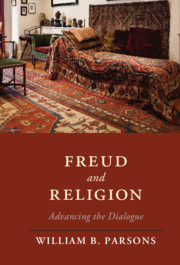Book contents
- Freud and Religion
- Cambridge Studies in Religion, Philosophy, and Society
- Freud and Religion
- Copyright page
- Contents
- Introduction
- 1 Why Freud Wrote on Religion
- 2 Totem and Taboo
- 3 Freud’s Moses
- 4 Future of an Illusion
- 5 Civilization and Its Discontents
- 6 Freud and Eastern Religions
- 7 Psychoanalysis and Religion beyond Freud
- 8 Revisions and Applications
- Conclusion
- Bibliography
- Index
5 - Civilization and Its Discontents
The Unbehagen of Religion
Published online by Cambridge University Press: 07 May 2021
- Freud and Religion
- Cambridge Studies in Religion, Philosophy, and Society
- Freud and Religion
- Copyright page
- Contents
- Introduction
- 1 Why Freud Wrote on Religion
- 2 Totem and Taboo
- 3 Freud’s Moses
- 4 Future of an Illusion
- 5 Civilization and Its Discontents
- 6 Freud and Eastern Religions
- 7 Psychoanalysis and Religion beyond Freud
- 8 Revisions and Applications
- Conclusion
- Bibliography
- Index
Summary
Freud’s final choice for naming what many consider to be his most famous cultural work is quite revealing. The preliminary title was Das Unglück in der Kultur, which translates best as “The Unhappiness in Civilization.” Unglück was then replaced by Unbehagen, which is hard to find an English equivalent for and, unfortunately, was eventually translated as “Discontents.” A better rendering would have been discomfort, unease, dissatisfaction, or the French word malaise. Even so, what Freud really meant by Unbehagen becomes clear only as his argument unfolds. Humans are dissatisfied and uneasy in civilization for the same reasons we have already seen: our innate aggressive instinct makes us asocial. But Freud adds a corollary to this: our dissatisfaction is increased by what he called the “unpsychological” proceedings of society, particularly its commands and institutions, of which religion stands at the forefront. Psychoanalysis is the therapeutic intervention that contributes to lessening not only (through active therapy) the unease in individuals but also (through the applied analysis of “cultural pathology”) the additional unease created by social institutions. Continuing the agenda initiated in Future of an Illusion, then, Freud was not only offering means to transform individuals but also advocating for social-structural change. The important, further details of what he meant by that, keeping in mind its relation to his previous work, is the task to which we now turn.
- Type
- Chapter
- Information
- Freud and ReligionAdvancing the Dialogue, pp. 133 - 150Publisher: Cambridge University PressPrint publication year: 2021



